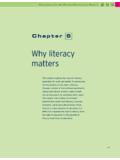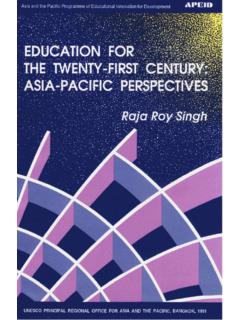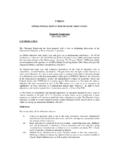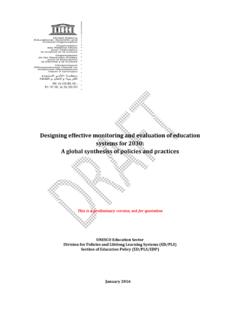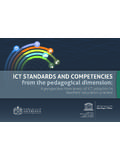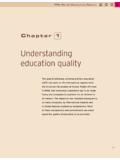Transcription of DOCUMENTS IN THE ENVIRONMENTAL …
1 DOCUMENTS IN THE ENVIRONMENTAL education SERIES. No. Year No. Year 1 Trends in ENVIRONMENTAL education since the Tbilisi Conference 1983 11 L'energie: theme integrateur en edu- 2 Guide on Gaming and Simulation cation relative a l'environnement 1985. for ENVIRONMENTAL education 1983 12 Guide on ENVIRONMENTAL education 3 Module educatif sur la conserva- Evaluation at School tion et la gestion des ressources 1983 1985. naturelles 13 Guide on ENVIRONMENTAL education 4 Educational Module on Values Teaching 1985. ENVIRONMENTAL Problems in Cities 1983 14 L'approche interdisciplinaire en 5 ENVIRONMENTAL education Module education relative a l'environnement 1985. for Pre-Service Training of 1983. Teachers and Supervisors for 15 A Problem-Solving Approach to Primary Schools ENVIRONMENTAL education 1985.
2 6 ENVIRONMENTAL education Module 16 ENVIRONMENTAL education Module on for In-Service Training of 1985. Teachers and Supervisors for Desertification 1985. Primary Schools 17 A Comparative Survey of the 7 ENVIRONMENTAL education Module Incorporation of ENVIRONMENTAL for Pre-Service Training of 1983 education into School Curricula 1985. Science Teachers and Supervisors 18 The Balance of 'Lifekind': An for Secondary Schools 8 ENVIRONMENTAL education Module Introduction to the Human for In-Service Training of 1983 Environment 1985. Science Teachers and Supervisors 19 Analysis of Results of ENVIRONMENTAL for secondary Schools education Pilot Projects 1985. 9 ENVIRONMENTAL education Module for Pre-Service Training of 1985 20 ENVIRONMENTAL education : Principles Social science Teachers and of Teaching and Learning 1985.
3 Supervisors for Secondary Schools 21 ENVIRONMENTAL education Module on 10 ENVIRONMENTAL education Module 1985. for in-Service Training of Health, Nutrition and the Social Science Teachers and Environment 1985. Supervisors for Secondary Schools 1985. 3 . Unesco-UNEP International ENVIRONMENTAL education Programme 15. ENVIRONMENTAL education Series A Problem-solving Approach to ENVIRONMENTAL education Division of Science, Technical and ENVIRONMENTAL education The designations employed and the presentation of mate- rial throughout this publication do not imply the expression of any opinion whatsoever on the part of Unesco concerning the legal status of any country, ter- ritory, city or area or of its authorities, or concer- ning the delimitation of its frontiers or boundaries.
4 Unesco, 1985. ED 84/WS-96. PREFACE. The international and regional meetings held since 1975 as part of the Unesco-UNEP International ENVIRONMENTAL education Programme, and especially the Intergovernmental Conference on ENVIRONMENTAL education (Tbilisi, 1977), have stressed the importance of providing those respon- sible for education at different levels with the information and concep- tual tools needed to foster the development of an interdisciplinary pedagogy geared to the solution of ENVIRONMENTAL problems. Using this approach, the present study describes several pedagogic procedures that might further educational activities aimed at the solution of environ- mental problems. This study does not aim to be exhaustives but invites research wor- kers, educationalists and teachers to consider the multiplicity of pos- sibilities in this field.
5 The choice of approach cannot be based on reading alone. It must be discussed and tailored to the available resources and, above all, to the needs of the potential students. In fact, there is no universal approach or teaching method adapted to all educational situations, however simple, to all learners and to all countries. The method used must be based on a large number of parameters, which are not always easy to define. The schoolteacher, the educationalist or the group discussion leader are in the best position to choose the most appropriate solution, provided they are in possession of an adequate repertoire of appropriate teaching methods. This paper, although based on international findings, will no doubt have to be amplified and revised in the light of the latest developments in various countries.
6 The first draft of this paper-was prepared by Richard Quetel, whose job it is to train teachers and who specializes in extramural teaching methods; his experience has been worldwide. The present version has been revised by specialists of the Unesco ENVIRONMENTAL education Programme with the help of Professor Christian Souchon of the teacher training and didactic methods research unit at the University of Paris VII. SUMMARY. Page I. THE DISCUSSION GROUP APPROACH .. 3. II. GUIDED ENVIRONMENTAL INTERPRETATION .. 11. III. CLARIFICATION OF VALUES .. 21. IV. GAMING AND SIMULATION .. 31. V. EXPERIMENTAL DEMONSTRATION WORKSHOP .. 45. VI. A PRACTICAL ACTION PROJECT .. 59. VII. ACTION-ORIENTED RESEARCH .. 71. A DISCUSSION GROUP. 3 . THE DISCUSSION GROUP APPROACH: GENERAL DESCRIPTION.
7 Function, role of teacher, community, difficulties Personal experience is largely gained with the help of language and must be translated into language if it is to be conveyed to others; to be shared, experience must be communicated. A discussion group is a spe- cific means of pooling experience through language. It is the function of every adult discussion group to facilitate the communication of expe- rience through language and to foster the formulation of ideas, proposi- tions, counter-propositions, etc. Moreover, in a discussion group it is possible to assess the degree of participation of individuals, their interest and comprehension by an evaluation of the quality of their interaction in the working group. The exchanges of view involve the whole series of distinctions, instruc- tions, codes and signs contained in the language, which tend to reveal the participants' thought processes.
8 The individual is helped to greater awareness of his own identity, to share in a socially significant expe- riment, and to gain a deeper understanding of his environment. While he must not succumb to 'meeting mania' or exaggerate the importance of speech in a group of adults (which would be tantamount to granting language primacy over action, the abstract primacy over the concrete and theory primacy over practice), the group leader must never- theless play a decisive role, above all in ensuring that everyone has a chance to take the floor. Before anyone is asked to 'take the floor' in a group, he must meet the following conditions: he must have something to say to someone, must want to say it and have the 'tools' to do so, a vocabulary and language skills. The discussion group will provide him with a privileged occasion and training ground for 'taking the floor'; in addition it will serve to sharpen these 'tools' through practical exercises in: passing on information received, - describing observed facts, - formulating precise questions on a given topic, - etc.
9 As for those involved, we can assume that adults, simply by agreeing to take part in a meeting or in collective action, show that they have certain 'expectations' of the action under discussion. The discussion group should enable them to express and clarify what is insi- de them and to find out more about the structure of their environment. Taking the floor in front of and in the midst of others is often difficult. The first problem as we have seen, is the use of language;. the second is asserting oneself in the group through words. To do that requires a degree of self-confidence in expressing oneself in public, which is often lacking. The discussion-group leader will have to resolve all the difficulties we have mentioned and also to surmount such psycho-sociological difficulties as: - doubts about one's right to speak (some individuals consider themselves to be of inferior social status and hence not entit- led to speak up), - fearing the opinions of others, - etc.
10 4 . THE AIMS OF A DISCUSSION GROUP. These aims can relate to knowledge (cognitive aims), values (axio- logical aims), or to the acquisition of skills or know-how (technical aims). By discussion, the group as a whole and each individual in it seek to raise their level of 'maturity', to enhance their ability to think things out in different areas, including that of effective common effort. 1 - The cognitive aims Presence in a discussion group and thinking about it enable the participants to increase their understanding of the interplay between one person and others or between him and the subject under discussion (interactions, interventions, attitudes and roles). This interplay, with all its positive and negative aspects, can be analyzed by various tech- niques: leading the discussion, evaluating and judging what others say, checking their suggestions and ideas, and making, delegating or thwar- ting decisions.

